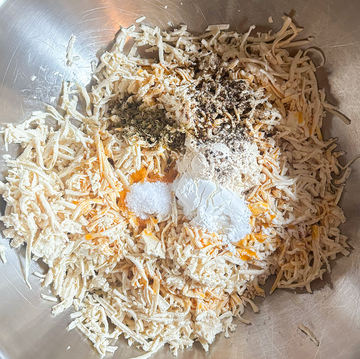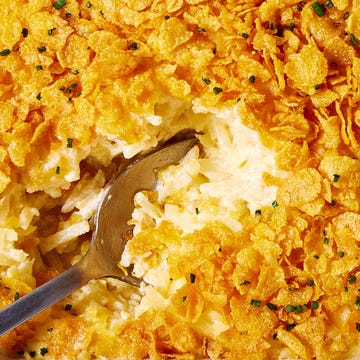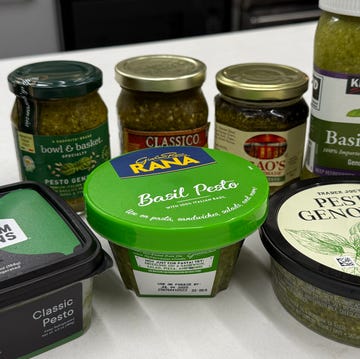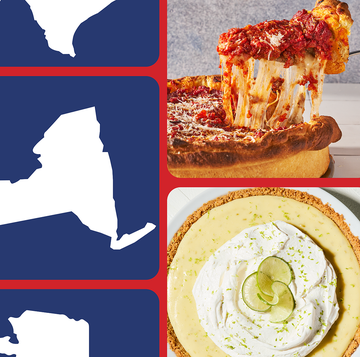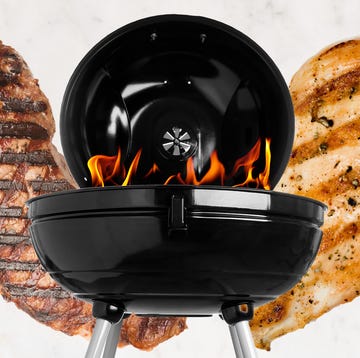I started eating protein pancakes two years ago while on a diet. According to HealthTok, protein pancakes are an easy way to boost your protein intake and satisfy your sweet tooth, all while staying within your health goals. Sounds perfect, right? Well…maybe not. While I wouldn’t recommend taking all influencer tips at face value, there is some truth in the online hype: Protein pancakes are an excellent source of protein, especially when paired with other breakfast staples like turkey bacon and cheesy eggs.
Now, with eggflation and rising grocery prices, many of us (raises hand) are searching for affordable breakfast alternatives that offer the same (or more) protein. Sure, Greek yogurt bowls and protein shakes are full of nutritional benefits, but sometimes, you just crave a warm, sweet treat. Enter protein pancakes.
They’re like regular pancakes but better. Unlike traditional flapjacks, protein pancakes "offer a good ratio of protein, fiber, and complex carbohydrates, which helps sustain energy levels while supporting muscle maintenance," says Kristen Lorenz, R.D., founder of Kristen Lorenz Nutrition. "They are also easy to prepare, so a convenient option for many with busy mornings who are looking for a high protein breakfast."
Plus, depending on the brand, protein pancakes can pack more nutrients than eggs. They sound like the perfect egg replacement, but before you dive in, let’s take a closer look: How healthy are these pancakes? And are all pancake mixes created equal? (Spoiler alert: Definitely not.)
Are Protein Pancakes Healthy?
Like eggs, protein pancakes are packed with nutritional benefits. However, not all pancake mixes are the same. Many protein pancake mixes, much like traditional pancake mixes, are made with refined flour, which provides little nutritional value, according to Lorenz. They’re often loaded with sugar and artificial ingredients.
To maximize the health benefits of your protein pancakes, look for mixes packed with protein, complex carbohydrates, and fiber to keep you full. Some brands swap refined flour for healthier alternatives like buckwheat, quinoa, or other whole grains.
"If made with whey, pea, or egg protein, fiber-rich whole grains, and minimal added sugars, protein pancake [mixes] can boost daily protein intake while supporting satiety and muscle health," says Lorenz.
Dietitian Yasi Ansari, M.S., R.D.N., C.S.S.D. echoes this, adding that pancake mixes made with whole wheat, oats, gluten-free grains, and amaranth or chickpea flour are typically more nutritious. Even if your local grocer doesn’t carry these types of pancake mixes or they’re too expensive, you can always make your own mix (more on this later). Or, you can add nutrient-rich foods like fruits or yogurt as toppings.
"Top pancakes off with fresh fruits," Ansari says. "Fruits provide additional fiber, antioxidants, and vitamins."
Protein pancakes aren’t "unhealthy," but stick to mixes with alternative flours if you’re aiming for a nutrient-packed breakfast. Or, skip the typical butter and syrup toppings in favor of nut butter, Greek yogurt, or fresh fruit for added health benefits.
What To Look For When Buying Protein Pancakes
Remember when I said not all protein pancake mixes are made equal? Yeah, knowing what to look for is key. Lorenz advises against falling for marketing claims like "low sugar" or "high protein." These labels often don’t tell the whole story. "It is always best to check the nutrition label," she says. "Ideally, whole ingredients should be listed first, such as whole grains and quality protein sources, rather than fillers or refined flours."
Furthermore, Ansari recommends looking at each nutrient's percent daily value (DV). For example, she says that if a product’s label has "20% or more of the DV, [it] means that a product is HIGHER in that nutrient." So, if a protein pancake mix has a 20% daily value of fiber on its nutritional label, it is high in fiber per serving. On the other hand, if it offers 5% or less, it’s considered low in fiber.
"When it comes to added sugars, per Dietary Guidelines for Americans, the recommendations are to limit calories from added sugars to less than 10% of total calories per day," Ansari adds. "This usually [means] no more than 50 grams per day." Keep that in mind when shopping for pancake mixes.
Can You Create Your Own Protein Pancake Mixes?
If your store doesn’t carry the protein pancake mixes you like, or they don’t meet your nutritional needs, why not make your own? Sure, creating a DIY pancake mix might take a bit more time, but it allows you to tailor the recipe to your specific preferences.
Lorenz recommends using half a cup of rolled oats, one scoop of whey or plant-based protein powder, one egg (you can use 1/4 cup Greek yogurt as a substitute), 1/4 cup of unsweetened almond milk, and 1/2 teaspoon of baking powder. Blend in a blender until smooth, and ta-da! You have pancake batter.
If you prefer sweet flapjacks, add in vanilla extract or cinnamon. Need more nutrition? Add in fruit like blueberries or bananas.
Concerned about your sugar intake? Ansari recommends adding natural sweeteners like honey or maple syrup. "Other suggestions are adding berries or bananas and adding warm spices like cinnamon, nutmeg, or pumpkin spice for more flavor," she adds.
Protein Pancake Brands To Buy
Okay, so you’re eating protein pancakes for your next breakfast meal but don’t know which brand to buy? I got you.
Ultimately, the brand you choose needs to reflect what you want for your body. That is, if you want your morning meal to keep you full for hours, you need a mix packed with protein and fiber. Prefer a sweeter pancake that doesn’t necessarily have a ton of protein but tastes hella good? A standard mix works for you. Honestly, the brand you buy is a personal decision.
That said, Lorenz does have a few products she keeps in her arsenal. "Brands like Kodiak Cakes, Birch Benders, and Bob’s Red Mill Protein Pancake Mix are great for their balanced macronutrient profiles, accessibility, and whole-food ingredients," she says.
Kodiak Cakes, specifically, are super fluffy and easy to prepare—you just need water or milk. Birch Blenders have a great taste, eerily similar to IHOP’s flapjacks, and don’t require anything more water. Plus, they come in different flavor options, from buttermilk to confetti. As for Bob’s Red Mill, they’re not the best-tasting pancakes (in my opinion), but they are super nourishing. "[They’re] a great option for those who prefer a heartier, whole-grain feel," Lorenz says.
Really, whether you choose store-bought or make your own, the right pancake mix comes down to your tastebuds, budget, and how much time you have in the morning. Sure, we’d all love to make our mixes from scratch, but let’s be real—sometimes cooking from scratch is just too much effort. The key is finding what works for you so you can enjoy a delicious, protein-packed breakfast that fuels your day. I’ll see you in the breakfast aisle, ay?







